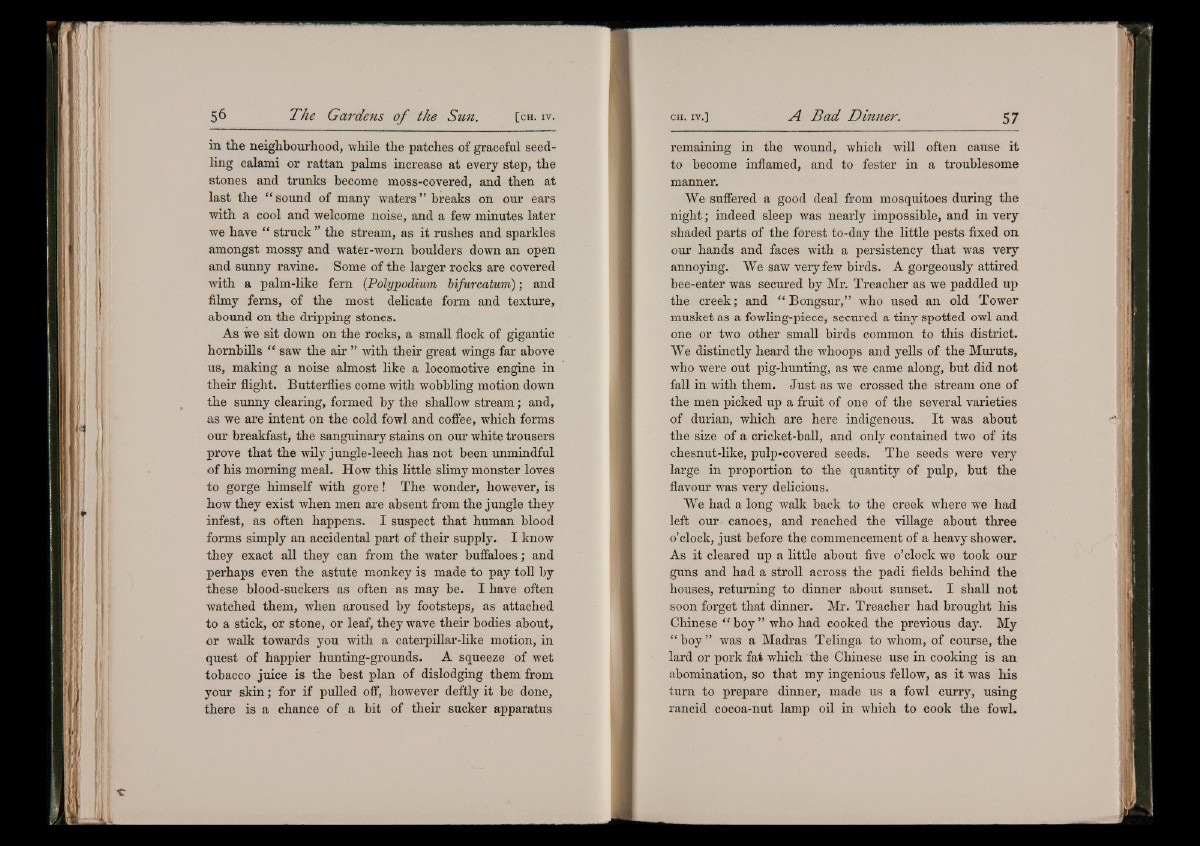
in the neighbourhood, while the patches of graceful seedling
calami or rattan palms increase at every step, the
stones and trunks become moss-covered, and then at
last the “ sound of many waters” breaks on our ears
with a cool and welcome noise, and a few minutes later
we have “ struck ” the stream, as it rushes and sparkles
amongst mossy and water-worn boulders down an open
and sunny ravine. Some of the larger rocks are covered
with a palm-like fern (.Polypodium bifurcatum); and
filmy ferns, of the most delicate form and texture,
abound on the dripping stones.
As we sit down on the rocks, a small flock of gigantic
hornbills “ saw the air ” with their great wings far above
us, making a noise almost like a locomotive engine in
their flight. Butterflies come with wobbling motion down
the sunny clearing, formed by the shallow stream; and,
as we are intent on the cold fowl and coffee, which forms
our breakfast, the sanguinary stains on our white trousers
prove that the wily jungle-leech has not been unmindful
of his morning meal. How this little slimy monster loves
to gorge himself with gore! The wonder, however, is
how they exist when men are absent from the jungle they
infest, as often happens. I suspect that human blood
forms simply an accidental part of their supply. I know
they exact all they can from the water buffaloes; and
perhaps even the astute monkey is made to pay toll by
these blood-suckers as often as may be. I have often
watched them, when aroused by footsteps, as attached
to a stick, or stone, or leaf, they wave their bodies about,
or walk towards you with a caterpillar-like motion, in
quest of happier hunting-grounds. A squeeze of wet
tobacco juice is the best plan of dislodging them from
your skin; for if pulled off, however deftly it be done,
there is a chance of a bit of their sucker apparatus
remaining in thè wound, which will often cause it
to become inflamed, and to fester in a troublesome
manner.
We suffered a good deal from mosquitoes during the
night ; indeed sleep was nearly impossible, and in very
shaded parts of the forest to-day the little pests fixed on
our hands and faces with a persistency that was very
annoying. We saw very few birds. A gorgeously attired
bee-eater was secured by Mr. Treacher as we paddled up
the creek; and “ Bongsur,” who used an old Tower
musket as a fowling-piece, secured a tiny spotted owl and
one or two other small birds common to this district.
We distinctly heard the whoops and yells of the Muruts,
who were out pig-hunting, as we came along, but did not
fall in with them. Just as we crossed the stream one of
the men picked up a fruit of one of the several varieties
of durian, which are here indigenous. It was about
the size of a cricket-ball, and only contained two of its
chesnut-like, pulp-covered seeds. The seeds were very
large in proportion to the quantity of pulp, but the
flavour was very delicious.
We had a long walk back to the creek where we had
left our canoes, and reached the village about three
o’clock, just before the commencement of a heavy shower.
As it cleared up a little about five o’clock we took our
guns and had a stroll across the padi fields behind the
houses, returning to dinner about sunset. I shall not
soon forget that dinner. Mr. Treacher had brought his
Chinese “ boy” who had cooked the previous day. My
“ boy ” was a Madras Telinga to whom, of course, the
lard or pork fat which the Chinese use in cooking is an
abomination, so that my ingenious fellow, as it was his
turn to prepare dinner, made us a fowl curry, using
rancid cocoa-nut lamp oil in which to cook the fowl.